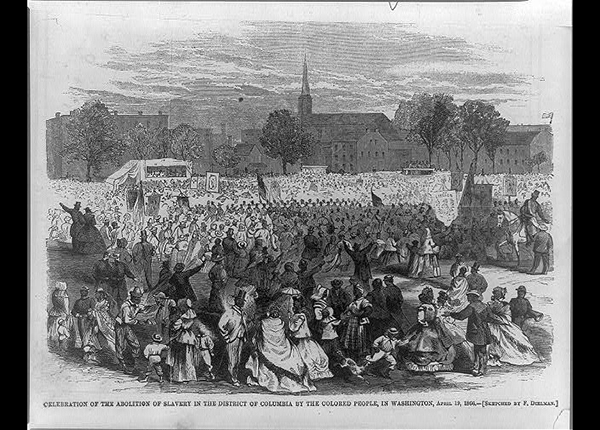Historic Document
District of Columbia Emancipation Act 1862
Congress | April 16, 1862

Library of Congress, Prints and Photographs Division
Summary
The District of Columbia Emancipation Act, signed by President Lincoln on April 16, 1862, officially ended chattel slavery in the nation’s capital. Senator Henry Wilson of Massachusetts – galvanized by the spectacle of slave auctions within sight of the Capitol building—sponsored the bill; its passage marked the culmination of decades of agitation by abolitionist forces in and around the District. Approximately 3,000 enslaved persons were liberated by the terms of the Act, months before Lincoln delivered his Emancipation Proclamation. This model of compensated emancipation and colonization of free African Americans was rejected just over three years later in favor of a total and uncompensated repudiation of slavery in the Thirteenth Amendment.
Selected by

Allen C. Guelzo
Director, Initiative on Politics and Statesmanship, James Madison Program in American Ideals and Institutions, Princeton University

Darrell A.H. Miller
Melvin G. Shimm Professor of Law at Duke University School of Law
Document Excerpt
An Act for the Release of certain Persons held to Service or Labor in the District of Columbia
Be it enacted . . . , That all persons held to service or labor within the District of Columbia by reason of African descent are hereby discharged and freed of and from all claim to such service or labor; and from and after the passage of this act neither slavery nor involuntary servitude, except for crime, whereof the party shall be duly convicted, shall hereafter exist in said District.
Sec. 2. And be it further enacted, That all persons loyal to the United States, holding claims to service or labor against persons discharged therefrom by this act, may, within ninety days from the passage thereof, but not thereafter, present to the commissioners hereinafter mentioned their respective statements or petitions in writing, verified by oath or affirmation, setting forth the names, ages, and personal description of such persons…and declaring his allegiance to the Government of the United States, and that he has not borne arms against the United States during the present rebellion, nor in any way given aid or comfort thereto….
Sec. 3. And be it further enacted, That the President of the United States, with the advice and consent of the Senate, shall appoint three commissioners, residents of the District of Columbia, any two of whom shall have power to act, who shall receive the petitions above mentioned, and who shall investigate and determine the validity and value of the claims therein presented, as aforesaid, and appraise and apportion, under the proviso hereto annexed, the value in money of the several claims by them found to be valid….
Sec. 8. And be it further enacted, That any person or persons who shall kidnap, or in any manner transport or procure to be taken out of said District, any person or persons discharged and freed by the provisions of this act, or any free person or persons with intent to re-enslave or sell such person or person into slavery, or shall re-enslave any of said freed persons, the person of persons so offending shall be deemed guilty of a felony….
Sec. 11. And be it further enacted, That the sum of one hundred thousand dollars . . .is hereby appropriated…to aid in the colonization and settlement of such free persons of African descent now residing in said District, including those to be liberated by this act, as may desire to emigrate to the Republics of Hayti or Liberia, or such other country beyond the limits of the United States as the President may determine….




